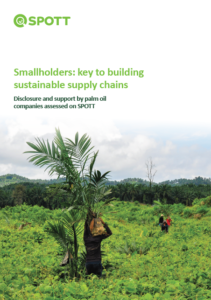Approximately 40% of the world’s palm oil is produced by smallholder farmers, making them essential parts of global palm oil supply chains. To help make sustainable palm oil the norm, it is crucial that smallholders are incorporated into company sourcing strategies and have access to sufficient technical and financial support to produce palm oil sustainably.
A new report from ZSL finds that there is a lack of disclosure by palm oil producers and traders on both the extent and locations of smallholders within their supply chains. Of the 58 companies assessed on SPOTT in 2018 that have smallholders, 41 companies (71%) report a planted area for their scheme smallholders. However, only 14% publish maps of their scheme smallholder locations.
Knowing where companies source from is critical to effectively implement and verify compliance with corporate commitments and legal requirements. This includes having oversight of both the independent and scheme smallholders in one’s supply base, including an understanding of the locations where they source from.
Smallholders often have limited expertise, capacity, and resources to produce palm oil sustainably. While not typically required by law, providing support and training to both independent and scheme smallholders can help companies ensure that the palm oil they source is produced in compliance with their policies, and helps ensure an efficient and legal supply chain. Only 35 companies (60%) provide details of their scheme smallholder support programmes, and only 26 companies (46%) report on their independent smallholder support programmes.
Publishing information on the percentage of a company’s supply base that is sourced from scheme and independent smallholders is important to understand the extent of a company’s footprint that is attributed to smallholders. More importantly, publishing this information alongside the number of scheme and independent smallholders they support and the types of support offered also allows for the robustness of company support programmes to be assessed.
Currently only 311,225 ha of smallholder production is RSPO certified, representing less than 1% of the global land area under cultivation. Smallholders are disadvantaged when it comes to getting certified as certification requires significant financial, technical, and human capital. Only five of 58 companies assessed on SPOTT have certified > 75% of their scheme smallholders.
Companies across the supply chain should ensure that their corporate sustainability commitments apply equally across all their sourcing – including to their scheme smallholders and independent suppliers. In 2018, less than half (40%) of companies assessed on SPOTT explicitly extended their sustainability commitments to cover all their palm oil sourcing.
With such a significant portion of the world’s palm oil produced by smallholders, unsustainable production practices on smallholder farms have consequences for several stakeholders, impacting the ability of investors, lenders, and buyers across the supply chain in meeting their sustainability commitments. To transform the palm oil sector, companies must extend their commitments to cover all their sourcing, disclose details of the smallholders in their supply chain, and increase support for the smallholders they source from.

